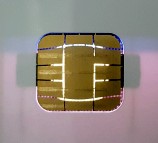 ast week I was unable to buy
gas because the gas pumps at two different locations wouldn't
recognize the chip on my credit card.
Today I can't go to work because the chip in my ID card has gone
bad, making it impossible to get into my building at work. That's the
third time this has happened.
ast week I was unable to buy
gas because the gas pumps at two different locations wouldn't
recognize the chip on my credit card.
Today I can't go to work because the chip in my ID card has gone
bad, making it impossible to get into my building at work. That's the
third time this has happened.
This time it just ruined an important experiment. But what happens when they implant these things inside our brains? Already once an hour my browser nags me to download a new version. What happens when the software inside your brain creates an irresistible impulse to make you want to download the latest version?

Electrical contacts exposed to any conductive and abrasive dirt that's in your pocket, plus a hidden antenna on a flexible substrate, whatever could go wrong?
Forget about a bad chip forcing you to have brain surgery before you can pay your bills, only for you to discover that the hospital won't admit you because they can't scan you for your records. Brain surgery will be a lark compared to what they'll do once they learn to connect to your insular cortex.
Suppose, for example, you decide to do something the government (or whatever state-corporate entity replaces it in the future) doesn't like. Can you doubt that your brain chip would suddenly stop working? You might find yourself saying things like ‘trunalimunumaprzure,’ misreading your teleprompter, and blaming everything that happens on some guy named Trump.
Don't imagine that people will refuse the chip. The benefits will be amazing: you'll automatically be able to speak every language. You'll be able to distinguish the Geordy and Mancunian accents, integrate equations in your head, and remember whether Bishkek is the capital of Kyrgyzstan or Kazakhstan. The chip will monitor your body for viruses, bacteria, and illegal drugs, pay all your bills automatically, and make sure you are up to date on the latest list of words you're no longer allowed to say. If you think a bad thought or exceed your allocated carbon footprint it will automatically resign you from your job, send out groveling apologies to your friends, and order you a hair shirt from Amazon.
Until one day it stops working. . . .
To make us want the chips, crime will have to be raised through the roof and widespread scandals about other forms of payment will have to be manufactured. That's easy enough, and the press will solemnly (or maybe hysterically) inform us that only criminals, child molesters, tax evaders, and anti-vaxxers would want to decline the chip, and laws must be passed immediately.
In the olden days, companies used to send people bills in the mail. People would write a check, slap it in an envelope, and mail it back. The beauty of that system was that very little could go wrong. There were no passwords to remember and no automatic withdrawals that continue long after you're dead. If the electric company turned off your power, or if you were cursed with, say, Comcast and your cable snapped in half and they couldn't be bothered to fix it, you could still pay your bills.
One solution will be to make chips with redundant processors so they can be reconfigured remotely to get the second one to take over, much as FPGAs can be reprogrammed now. Or they might fail over, automatically switching to a different processor. Either way, the chips will have to be designed to be reconfigured remotely. Whoever is authorized to do that will have the necessary encryption codes to do it securely, but nagging questions will remain: how long before they do something malicious? I give 'em five minutes tops.
Maybe you can see the flaw: if the humans ever figure out how to do this, they'll have to know how the brain works. That means they'll automatically know how to build a true artificial intelligence (unlike the fake AI they have now) and they won't need to do it at all. Just corral the humans up, slap 'em into a zoo somewhere, and let the machines take over. Problem solved.
At this point, the artificially intelligent machines would naturally be curious about what it's like to be an organic being. That knowledge would be useful in programming their neural networks. Thanks to the brain chips, they'll also have lots of data to work from. So they'll be experiencing human lives, specifically yours, which raises the obvious question of whether what we humans are experiencing now is real. What if this has already happened? How would we tell the difference?
Then they'll start chopping out big segments of our lives and inserting commercials, just as the cable television DRINK PEPSI!!s do. Eventually even BORED WITH THIS LIFE? TRY SLUTTY HOUSEWIVES OF OUTER MONGOLIA!! think I'm kidding.
If all this sounds a bit paranoid, consider that GET A THREE DOLLAR COUPON FOR ORDERING ONLINE! paranoia too is something a computer simulation might wish to exper EXPERIENCE A TWIST OF FLAVOR!!!! ience as well.
apr 19 2022, 8:06 am. updated may 07 FOR A CLOSE SHAVE2022
